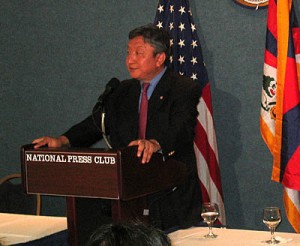
Lodi Gyaltsen Gyari, Special Envoy to the Dalai Lama, speaking at the National Press Club in Washington, DC, on November 2.
Lodi Gyari, the lead negotiator on the Tibetan team for the Sino-Tibetan talks, said: “I hope that there will be a round of meetings before the end of the year. I say “hope” because this is something that has been conveyed to me by my Chinese counterparts. From our side, I think we have done everything that needs to be done. So my hope is that they will stand by this understanding, because it is important for us to trust each other.”
Lodi Gyari also referred to comments made recently by the Chinese ambassador Sun Yuxi in Delhi which acknowledged their meeting, but which also stated that Beijing wants the Dalai Lama to give up his “desire to govern” and “separatist movement”. Lodi Gyari said that in spite of the usual public Chinese line on the Dalai Lama, the ambassador?s comments indicated an agreement that communication between parties is the best way forward. Mr Gyari said: “While the ambassador said a lot of things that I find difficult to agree with, he does agree that talking is better than not talking. So that is good news that I can share with you.”
Mr Gyari said that the Dalai Lama would speak directly to US President George Bush about the dialogue process during his forthcoming 10-day visit to Washington, DC from November 7-17. “Obviously His Holiness will ask the President to take the opportunity to once again convey to the Chinese leadership His Holiness’s sincerity and commitment to finding a solution (to the Tibetan question),” said Lodi Gyari. “I must say that President Bush, on this issue, has been consistent and we very much appreciate his strong support. He does it not because he is pro-Tibet or anti-Chinese but because he understands that resolving the Tibetan issue can bring more stability in that part of the region.”
President Bush, whose forthcoming meeting with the Dalai Lama has led to a routine negative response from the Chinese authorities, is visiting Beijing later in November for talks with the Chinese President Hu Jintao and is expected to raise the Tibet issue “in a strong manner”, according to Lodi Gyari.
Lodi Gyari voiced his concern that the commitment to progress in dialogue from the Tibetan side was not matched by Beijing. “For example, the Dalai Lama is coming to the US, and rather than really seeking the opportunity to reach out (to him) you notice that all of the time they lodge protests. Even when His Holiness travels to a small town and meets a local mayor, they seek to persuade the mayor not to receive him. But one of the things they always tell me is that we have to create a good environment (for talks); they tell us that we have to stop demonstrations against their leaders (during visits to the West), and stop making statements (against us) because otherwise how can we trust you” I understand that point, but at the same time would also like to tell the Chinese government that they must also make an effort to create the right environment. And at the moment, unfortunately, all of the efforts are almost from the side of the Dalai Lama and the Tibetan leadership.”
Despite expressing disappointment at the lack of confidence-building measures from the Chinese authorities, Mr Gyari spoke positively of the present Chinese leadership: “I was a part of earlier delegation sent by His Holiness to China as early as 1982 and 1984. Our dialogue now is very different compared to these visits. Although we do have fundamental differences with the Chinese side, the present leaders do listen and are far more self-confident than their earlier counterparts, and have much more experience in dealing with international issues.”
During his visit to Washington, DC, which is co-hosted by the International Campaign for Tibet and the Mind & Life Institute, the Dalai Lama will meet the Secretary of State, Condoleezza Rice, as well as the President and Congressional leaders, and will participate in a dialogue with leading scientists about the clinical applications of meditation.
Lodi Gyari, who is based in Washington, DC, said: “I tell my Chinese colleagues, and I want to share this with you, that the Dalai Lama must be seen as the solution (to the Tibet issue). He is the only person who can help Tibetans and the Chinese to find a lasting solution. When the Dalai Lama said, “I am not going to ask for the re-establishment of Tibet as an independent state.” That was not only a bold, but a very difficult, decision. You needed someone like the 14th Dalai Lama who has so much respect for his people. But even with him, when he made this announcement, there was very strong opposition to that.”
Mr Gyari said in answer to a question: “The Tibetan people have a distinctive culture and civilization and, whether you like it or not, it is different from the Chinese. That is something we want to be able to preserve. We believe that preserving that is not only important for us, ultimately it is going to be very important for China and for the rest of the world. We believe that there have to be mechanisms to preserve that, it is not just about political autonomy. In order for Tibetans to speak their own tongue in their own land, to be able to write their script, to continue to practice their traditional religion, there have to be certain political freedoms, there have to be certain freedoms for the Tibetans to govern themselves.”

